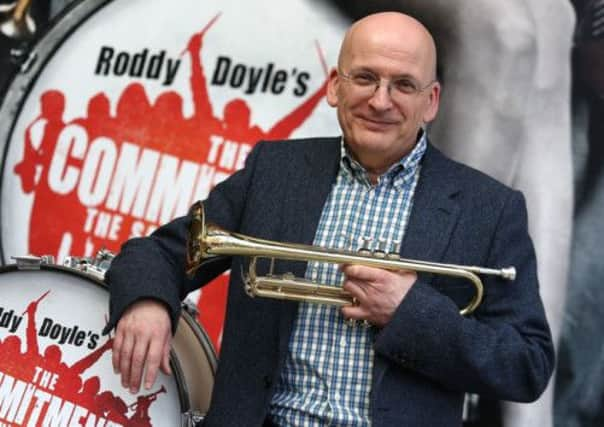Book review: The Guts by Roddie Doyle


The Guts
by Roddy Doyle
Jonathan Cape, 328pp, £12.99
The even more ground-breaking strain of Dublin dirty realism that began with his scripts for the BBC TV series The Family in 1994 topped out a full seven years ago with Paula Spencer. And just look at what he’s doing now, the begrudgers would complain: topping up his pension fund with a specially written stage version of The Commitments opening in London’s West End next month and preceding it with this new novel updating the story of their now 47-year-old manager, Jimmy Rabbitte? Creatively, isn’t all of this just treading water? After a quarter of a century, hasn’t the Rabbitte family saga finally run its course?
Not for me it hasn’t. And while I haven’t recently re-read the Barrytown trilogy (The Commitments, The Snapper and The Van) in which Doyle introduced us to the Rabbitte clan, I don’t doubt for a second that they would still read as fresh and as funny as they did all those years ago.
Advertisement
Hide AdBecause if there’s one thing Doyle’s new novel The Guts reminds us, it’s that your man has an unsurpassed ear for north Dublin dialogue in all its streetsmart, sociable, sweary glory.
The begrudgers would argue that that is pretty much all it’s got. And they’d have a point: this is a novel almost completely denuded of description, and all elements of back-story – about Jimmy Rabbitte’s work as digital archiver and distributor of old Irish music for Kelticpunk.com, for example – are only skimpily sketched in.
That apart, the book is almost all dialogue. And when you think how much work it’s got to do, it’s a triply virtuosic exercise. First of all, the dialogue has to show what it’s like for Jimmy Rabbitte to undergo treatment for bowel cancer. No facial reaction shots, remember; no internal running commentary of Jimmy’s existential fears, and no tired clichés of embarrassment either. This is, after all, the Rabbitte family we’re talking about – sprawling, boisterous, shameless and, yes, loving and caring too.
Then there’s that other impossible subject to talk about, argue and enthuse over in dialogue alone: music. And not just any kind of music: Jimmy Rabbitte has set himself a mission: to dig out, for an ecclesiastical anniversary, the alternative Irish music from 1932 that was NOT swamped by the non-threatening, platitudinous, daintily middle-class music of the still-new Irish Free State.
When he comes across one such song, he recognises that missing ingredient instantly. “It had none of the Paddy, none of the dishonesty at the core of every Irish song Jimmy had ever heard, except Teenage Kicks’ and maybe The Boys Are Back in Town,” he notes.
Is it too much to claim that Doyle’s dialogue has done something similar for the Irish novel? Perhaps – although in novels such as Paddy Clark Ha Ha Ha and The Woman Who Walked Into Doors Doyle expanded the range and impact of Irish fiction far more than any of his contemporaries.
Advertisement
Hide AdIn The Guts, though, the dialogue faces the still further challenge of differentiating between a largish cast from precisely the same part of the world – the north Dublin suburb of Kilbarrack, where Doyle grew up, taught for 13 years from 1980, and which he has forever fictionalised as Barrytown.
But Doyle’s fiction – even when writing about the Rabbitte family – is not stuck in an Eighties timewarp. The opening sentence of The Guts makes this crystal-clear. “D’yeh do the Facebook thing?” Jimmy asks his Da (now in retirement after that entrepreneurial flurry witnessed in The Van) and of course he does too.
Advertisement
Hide AdAnd if his Da is doing the Facebook thing, Jimmy is even more au fait with new technology. He’s learning to play the trumpet with the help of YouTube (“Say M, your man said, then smile. Then blow”) and watching his son Marvin and his band rack up the watching millions there with a clip of his own. He’s putting dates in his phone’s diary when he hopes to meet up with Imelda Quirke (The Commitments’ backing singer and still crazy and sexy after all these years). He’s using his intern’s iPad to listening to her selection of underground bands from 1932, texting and leaving messages, shooting off emails and picking up Facebook poll results. And of course all of that is linked into the dialogue too, the way you’d expect from a master like Doyle.
The Guts isn’t his finest: the scenes at the lads’ rock festival lost weekend tend to drag, and the sub-plot involving his Marvin is, frankly, ridiculous.
But it’s still rare to come across a dialogue-driven cancer story that isn’t portentous, over-reflective or mawkish, that notices detail and can convey affection with humour. Jimmy’s wife Aoife, for example, buys him tracksuit bottoms to wear on leaving hospital after his operation: “cancer trousers”, she’ll call them, and they’ll become a standing joke – and, in her texts, a shorthand for sex – between them.
Of itself, that’s just an insignificant detail: Doyle’s skill lies in putting together enough of them that he can flesh out a portrait of a marriage through dialogue alone without ever having to directly point out its love and stability.
So is Roddy Doyle losing his touch? As long as he can write dialogue like this, that swings between heartbreak and laughter, the very question is impertinent.
• Roddy Doyle is at the Edinburgh Book Festival on 10 August